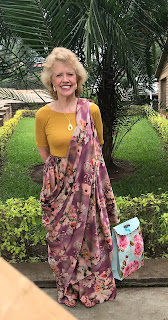PCVs Evacuate - #1
As of today, Thursday, April 16 (I try to write my blog posts on Thursdays), I am have been back in the United States for a month with the first 14 days staying quarantined as was highly recommended by Peace Corps upon our return stateside. I had promised a post about the wedding I attended on May 7 and it will be forthcoming, but I thought I might share with you my experience as an IS/EVAC/COS (oh, those acronyms!) Peace Corps Response Volunteer from the Teacher Training College (TTC) in Kabarore, Rwanda. This may take a few weeks to finish and since I am not in Rwanda any longer, I will share some of the photos that an acquaintance is taking in this stunningly beautiful country. (@jonkmania)
One of the highlights of my teaching at TTC was teaching an English Communications class. The teacher was so kind and gentle and he suggested that we use topics provided by the Rwanda Education Board (REB). For the first couple of classes, we did just that, but I was noticing that the students seemed to be regurgitating what one of their fellow students had already said, and to me, it seemed as if they were not really using their critical thinking skills. I then began reading the Rwanda News site (The New Times) together with other worldly news sites seeking out topics that may be of interest to these young minds so that we might engage in some passionate and interesting debate. Topics included the use of drones (for my students, drones are used for the transport of blood), the Tour du Rwanda Bike Race, Robots (they talk of one robot that they all know: Sophia), and of course, COVID-19. I began presenting coronavirus (it did not yet have a name) to them when there were only a few hundred cases in China. These young Africans are familiar with disease as they live with the fear of malaria every single day and they had just begun celebrating the fact that there were no more cases of Ebola in the Democratic Republic of the Congo.
As the weeks went by, we continued to talk about the virus and I regularly showed them the CDC map showing countries that had had COVID outbreaks. I remember telling them numerous times that there were no cases in Africa as of yet, but that it had spread throughout much of Asia. The following week, I showed them that it had reached Europe, but it still was not yet in Africa. Yet another week went by and I showed them that yes, in fact, it had reached Africa in Egypt and Senegal, but not yet in Rwanda.
It is important to note here that Rwandans have cultural customs and habits that do not lend themselves to fighting off a respiratory disease like SARS 2. First of all, it is important to shake one’s hand whenever you meet them. The hand that is not used in shaking is gently crossed and put over the top of the opposite forearm. It is a beautiful custom and very respectful. Even as I was taking my frequent 45’ walks into town, locals would reach out to me to shake my hand. Hand washing is yet another issue: since there were often times that running water was not available, hand-washing was not really a regular practice (n.b. there were hand washing stations at the school, but the buckets were empty). Finally, since I was working with students at the height of puberty, touching one’s face was a frequent occurrence. Some students had hand-made handkerchiefs, but most of the time, they just used what they had at hand (no pun intended)
Next week: when I came to the point of deciding that I wanted to return to the U.S.
"The content of this website is mine alone and does not necessarily reflect the views of the U. S. Government, the Peace Corps, nor the Rwandan Government."







Comments
Post a Comment